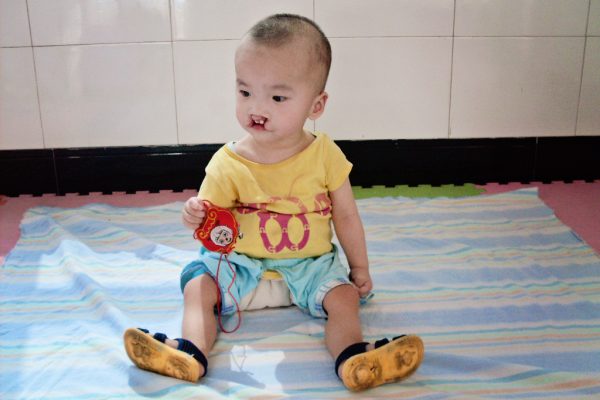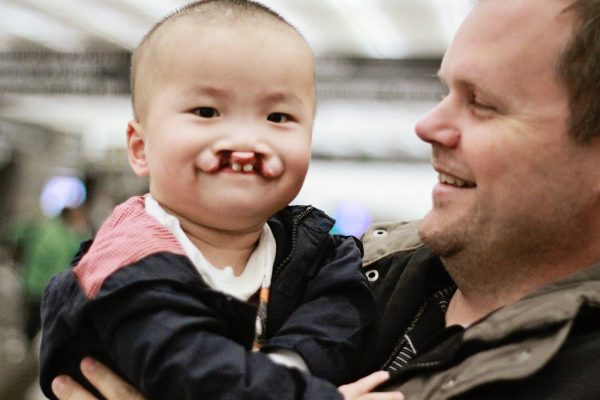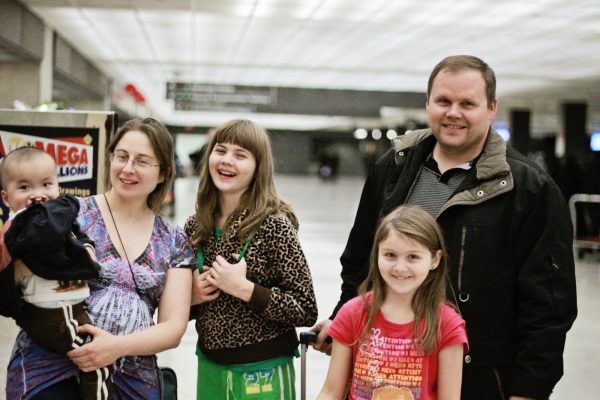Five and a half years ago, my arms ached to hold my son, a world away in China…

When I couldn’t sleep, and I had said everything to God I could think of, I would do three things:
1. visit Google maps to zoom in on a city that is as far away as it could be from me
2. stare/watch “gotcha videos” on YouTube
3. read every blog I could find about adoption
There were so few blogs from my son’s province, and fewer about children from his city. One of the few blogs I did find was written by a mama of a child who refused food. Because she had shared their story, I was not completely shocked by my son’s similar refusal when we got to China.
As soon as we got LOA for our son, we were allowed to send a care package. I hadn’t had an update in 10 months. Nothing can describe seeing the new pictures better than Proverbs 25:25, “Like cold water to a weary soul is good news from a distant land.”
My precious son, how he had grown since the last pictures! He had been blessed with the traditional icing on his head from his beautiful second birthday cake. And he was clearly unhappy that cake was in his mouth. My suspicions about his relationship with food grew.
At the time I wasn’t sure what to call what I was seeing in the pictures, or what the child I read about on the other mom’s blog was experiencing. Now I know: oral aversion, or oral defensiveness. There is no one “cause” although there are trends. It is frequently related to sensory processing differences and lack of exposure to solids in the 6-12 month age range.
When we met our son, our flight had been delayed, and it was getting late. He had probably never been out of the orphanage, and now he’d been in a van for around eight hours, handed to strangers, everything in his world turned upside down. He was shut down and grieving and went to sleep before we fed him. When Zhou saw the food at the fabulous breakfast buffet, he covered his mouth with one hand and his eyes with the other. He was terrified to watch us eat. If I tried to offer him tidbits that would delight most two year olds, the terror intensified.
A more experienced adoptive mom reminded us of some feeding tips:
– boiling hot bottle
– lay your child flat on their back
– don’t touch them while they are eating
That’s where we started, and moved forward from there.


We headed to a cleft team a week or so after we got home, and the surgeon asked us not to try solids yet since he was so averse. We’d have surgery soon, and he would be on a liquid diet for at least three weeks. So we kept going with formula from a bottle. Any addition of cereal, juice, or Stage-1 baby food to his bottle brought about terror.
There was no fooling him. He was vigilant. He grew more comfortable with watching us eat, and we worked on touching foods. He was so much like a nine month old developmentally that it didn’t seem strange that he wasn’t eating, so I was happy to go with the flow.
Should we have pushed harder at this point? Maybe. I can see the appeal of tackle the problem quickly… the older the child, the harder it will be to fix… he’s already almost 2.5…
But I don’t regret the way we did things either. He was so afraid, and we bonded so well. Maybe forcing him to face his fears would have hindered more important development.
I worked on rubbing lotion into the very dry area of lips and gums surrounding his cleft with my finger. We had him sit at the table and watch us eat, and offer him a little of each food to touch. Occasionally I would swipe a thin layer of food like soup or mashed potato on my finger and get it into his mouth. All of these activities were unpopular.
Zhou had cleft lip and palate surgery exactly two months after he landed in America. We spent two nights in the hospital. Mouth pain, not knowing how to use new mouth anatomy to swallow, swollen airways and throat from surgery, and not being allowed to use a bottle, the only mode of feeding he would tolerate, made for a disaster.
Many families use open cups or large serving spoons to pour food into their child’s mouth after cleft surgery. Neither of these would work for us. The hospital gave us a syringe, but Zhou was really terrified of it. The TenderCare feeders we had ordered were easier to use, I didn’t have to stop to refill as frequently, and he wasn’t as scared of them. (Since then, I have seen other families use other items after surgery, such as condiment dispensers, which is pretty clever.)
Feeding Zhou was a two person job for 10 days after surgery. One had to hold him in a tight snuggle, because he would defend his mouth area. The other waited until he yelled and squirted a little formula into his mouth. When I say it was miserably awful, that is an understatement.
Zhou had night terrors for about 10 days after we came home from the hospital. Whether they were from the anesthesia, pain, feeding stress, or a combination, we can’t be sure.
The big surprise was that after almost a month of no bottles, he totally refused bottles and was still pretty resistant to the TenderCare feeder. Now we had no good option. After a few days of trying, we were able to get back to bottles. He would only take bottles if they contained Pediasure. Since the TenderCare feeder wasn’t exactly his favorite anyway and he was still fighting during feedings, I started mixing Stage-1 sweet potato into the formula and squirting it in.
It took a few days, but he learned how to swallow the slightly thicker liquid. This was our first success with non-formula. At that point, I didn’t realize what a big deal this was, but for cleft kids, learning to use their new mouths after the palate repair is challenging.
For most kids with oral aversion, their oral muscles are very weak and learning to swallow new textures is not just a skill, but a step toward strengthening these muscles, which are important for eating, speech, and not drooling. In fact, within a week of when he started becoming adept at swallowing formula with puree, Zhou totally stopped the copious drooling he’d had since surgery.
Riding the wave of this progress, I started introducing a few new activities. We tried tooth brushing with a finger toothbrush. The cleft team said not to push the issue if he resisted so that I didn’t accidentally damage the repair, but we tried to get familiar with it.
We put spoons on the floor, all over his play area. Eventually, he started picking them up and using them as mirrors, but would not let them into his mouth. Still, baby steps to getting familiar with these feeding tools.
About a month later, when Zhou had been with us for four months, I started squeezing undiluted baby food from pouches into his mouth. Spoons were still not welcome, and really, neither were the pouches, but I was really starting to get very nervous at the lack of natural progress.
At first, he held puree on his tongue, protruding out of his mouth, until I wiped it off. Even if it took 20 minutes. It took about a month of getting a few squirts from a pouch each day before Zhou could move the puree around in his mouth and swallow it. Within a couple weeks, he started making attempts at expressive language for the first time.
We started to notice that there was a close correlation between feeding progress and speech progress.
At this point, eight months after adoption, Zhou was starting to get the hang of games like Patty Cake. We invented several games that were intended to help reduce oral defensiveness. Zhou had started chewing on a few items again, including the baby linky ring, so when he signed “eat,” I put him into a high chair with the linky toys, and dipped them all in baby carrot puree. He eventually, voluntarily, licked some. This was a big first.
Then I offered a Gerber puff. He played a sad “peek-a-boo” game with the puff. You could see the inner conflict: I’m hungry, but afraid. She wants me to eat it, and she’ll clap and cheer, but I’m afraid. Heart wrenching. He even brought it up to his mouth a few times, and then turned away dramatically. He’s not a dramatic person, either. He also had a night terror that night. We were so thankful for progress, but it was really hard to watch Zhou struggle for each gain.
About a month later, we went to the Zhou’s first cleft team appointment since his surgery. Everyone was very happy except the developmental psychologist. He thought that “an almost three year old should be off the bottle right now!” He had no suggestions about other ways we might actually feed him either. When I got the report from the team in the mail, it said that he thought “mom was resistant to my suggestions”. I had told him that I thought maybe the attachment people would disagree with him, and that I placed more value on secure attachment than age-appropriate milestones.
Guess my opinion didn’t convince him. I would have expected someone in his field to have a little flexibility for someone that spent 27 months in an orphanage and only eight months in a family.
I am very thankful, however, for the wonderful speech, occupational, and physical therapists who came to our house from our county’s Early Intervention service until Zhou turned four. Only the OT had any experience with oral aversion, but they were all a wealth of information. They did research, and kept me from feeling hopeless when progress was slow.
Their approach was to put bonding and nutrition first, and then to work on new oral skills that would eventually help Zhou have age appropriate eating. I felt very comfortable with the way they treated him and me. I was always present for therapy, and they never restrained him or continued to touch his mouth if he cried or panicked.
Basically, feeding therapy consisted of poking a spoon with a little “desirable food” at his mouth, while Zhou turned away and avoided it. Sometimes we used a “desensitizing wand” to try to rub on his cheek, lip, tongue, gums, and eventually all around in his mouth.
The therapist suggested that if his oral aversion was connected with other sensory issues, he might prefer crunchy foods to mushy foods, which was surprising and counterintuitive to me. We started including safe finger foods like Cheese Puffs and baby cookies in our therapy.
He also started letting me “pour” an empty soup spoon into his mouth, and this “game” eventually progressed until I could pour some actual soup in his mouth. Then, his feeding therapist actually managed to get a few bites of pudding past his lips on a spoon, and although he wasn’t opening his mouth happily, he didn’t have any crying or fighting either. When he was done, he signed “all done” instead of crying. Whew!
When Zhou had been home for one year, an offer of pudding or puree on a spoon would occasionally be met with a swipe of his finger, and then licked off. Huge progress, even though he wouldn’t let the spoon in.
Then the most amazing thing: Granddad taught Zhou to drink from a straw. Straws are huge oral muscle strengtheners.
After his oral muscles started getting stronger, the occasional Cheerio that got into his mouth was easier for him to move around and control. Once, his feeding therapist got a Cheerio in his mouth and he accidentally crunched it. As he went to pick out the pieces, I grabbed his hands, clapped with them and cheered. He consumed his first Cheerio.
I think this was the turning point, because having more control over the item in his mouth reduced his fear significantly.
Another turning point came right at the end of a therapy session, where we were not able to convince him to lick or sip anything at all (and were feeling discouraged)… then he said “bath!”. I told him he could have a bath if he licked, and the little tongue came right out and licked the baby food. Wow! He got that bath right away!
The next week, our wonderful feeding therapist came, armed and ready, with a new little chart. It had five velcro pandas and a velcro bathtub. We told him to lick five times and he’d get a bath. He was resistant at first, but when he realized that licking got a panda, and pandas meant bath, he hurried up and licked the food.
At the next session, we told him he’d have to get ten pandas. He got them so fast, that we told him that for the last two, he’d have to let the feeding tool into his mouth, not just lick. It didn’t take much convincing… just a little… and he let me put it all the way in his mouth and he closed his lips! In this case we were using a dipping tool instead of a spoon because he seemed a little more willing to let it into his mouth.
Very soon after this, Zhou had another language explosion. He started talking much more, using more two-syllable words and stringing together two to three words.
We were now 16 months post-adoption. My husband had recently returned from a one year deployment. Zhou had been licking and consuming solids a little more readily, so daddy decided to kick things up a notch.
I showed him what we’d been doing, and he got Zhou to eat an entire little tub of baby food! The spoon wasn’t going inside his mouth much, but he was licking up the food. After the first few times, it took about 15-20 minutes to feed him a Stage-2 baby food tub. We started using a baby food grinder to squish the food we were eating as a family for Zhou, but for Stage-3 baby food or homemade baby food, it still took about 90 min. per feeding. We entered a stage of daily therapy where we were spending 4-5 hours per day feeding Zhou, and several weekly visits from speech and occupational therapists. This was a pretty challenging but rewarding time.
Next, we worked on helping Zhou feel comfortable with eating in less familiar places. We started with his car seat, so we would be able to go out more easily. Then we practiced in the church nursery, good friends’ houses, and finally restaurants.
As we were approaching Zhou’s fourth birthday and two years at home, we were able to stop using bottles all together!
The last frontier was chewing.
Chewing takes lots of oral muscle and determination. There’s a big difference between swallowing food that is in your mouth, and determining to chew food until it can be swallowed. We really weren’t sure how to teach a person to chew. I had asked our OT about it, and really what we did was make exaggerated chewing motions at Zhou and hoped he caught on. It took about a year, but he did.
Leaps forward in feeding often happened when Dad was in charge. Matt was willing to push a little harder than I was… making Zhou a little nervous. Sometimes I would go to a meeting and come home to find that Zhou had eaten spaghetti that wasn’t cut into tiny bits, or a whole sandwich! Biting small pieces off of a larger piece is an important step in self-feeding, and sandwiches worked for that. Eating salad takes real determination, Zhou will only last for about five bites before he just won’t chew anymore. We finally got to the point that Zhou could eat almost everything that we ate as a family.

I’ve learned several things in the last five years….
I should never underestimate Zhou.
Just when I think that we will never make progress, a big leap forward comes.
Having a husband who is very different from you is a blessing.
There is a place for gentleness and waiting and a place for moving forward. I think that the key is that Matt sees that Zhou is able to do something even if it is still slow and uncomfortable, and he is willing to require Zhou to keep doing things that he can be successful at, even if they are hard.
You are not alone.
If you are parenting a child who struggles with oral aversion, we have a small community of moms in a Facebook group called Adoption and Oral Aversion Support. Feel free to send me a friend request! Thankfully there aren’t many of us… and we aren’t the most active group…because many of us are thriving! However, we will surround you with support and suggestions.
– guest post by Maria: facebook || blog
*After a life-changing mission trip to Zhou’s orphanage, seven of us contributed to a book called Cradles in Q City, which is available on Amazon. God led me through anger and unforgiveness about Zhou’s early years and into freedom and a deeper trust in Him. He showed me that prayer changes me profoundly and changes circumstances for orphans. All profits support adoptions and similar mission trips.

























Leave a Reply